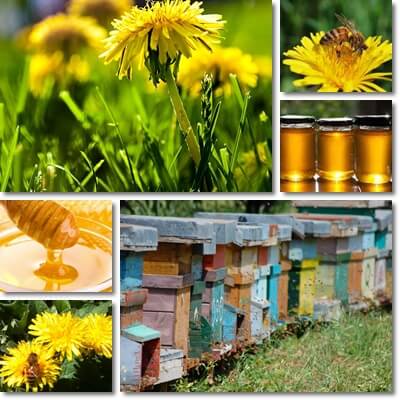Dandelion honey is a monofloral variety made from the flower nectar and pollen of dandelion flowers. It is a strong flavored honey with antibacterial, anti-inflammatory, antioxidant and mild diuretic and prebiotic properties. It is commonly consumed for its beneficial action on digestive and liver health, but also used for various skin concerns. Like all honeys, dandelion too boasts a good nutritional content, being a good source of vitamins, dietary minerals, enzymes, amino acids, antioxidants, natural sugars, pollen and other elements with nutritional value.
What is dandelion honey made of?
Dandelion honey is made from dandelion nectar and pollen. The most widespread species of the flower are Taraxacum officinale (the common dandelion) and Taraxacum laevigatum (the red-seed dandelion or the rock dandelion). These are but two of dozens of species native to Europe, Asia and North America and honey bees can make honey from all of them. Despite being monofloral, dandelion honey is not made from a single flower species, but several.

More exactly, it contains, for the most part dandelion nectar and pollen, but also varying amounts of other flower nectars and pollen, depending on what’s in bloom at the same time with the dandelions, and in the same area. Moreover, there are different standards set in place around the world when it comes to evaluating the purity of dandelion honey. For example, dandelion honey is required to have no less than 10% dandelion pollen, but the purest honey can have up to 60-70% dandelion pollen. Why can some have less than 10% dandelion pollen and still be labelled as monofloral dandelion honey? Because this particular variety has a strong flavor profile that stands out even when there is little of it.
However, the best dandelion honey is the purest one, with as much dandelion pollen as possible. And in order to enjoy all the unique properties and health benefits of this particular variety, you need to choose the purest one. If you find the taste unappealing or bad, then maybe you would like another honey altogether better. So know that even though the label says monofloral or unifloral, remember to always check the origin of your honey for important information such as this.
What does dandelion honey look like?
The purest dandelion honeys are a bright golden-yellow color, but you can find the honey in a darker amber (brownish yellow) as well. Generally, it is preferable to get a lighter-colored one. Just like acacia or clover, dandelion too has a fast crystallization time and begins forming small crystals in a matter of months following harvest. The more solid it gets, the more opaque its color. Also, the variety turns darker when crystallized.
What does dandelion honey taste and smell like?
This particular honey is known for its strong taste profile and has a medium sweetness. It has a persistent aroma and includes strong woody, herbal, chamomile or dandelion-like, slightly vinegary notes. There is a certain pungency or sharpness to it and it smells as if it were more of an essential oil than a honey. While it’s not bitter or necessarily unpleasant tasting, it lacks the delicacy and floral sweetness of other honeys. To some, it almost tastes as if it weren’t good to eat and smells medicinal, like herb-based preparations or bitter medicines.

What are the health benefits of dandelion honey?
What is dandelion honey good for? This particular honey is most appreciated for its therapeutic action on the liver, gall bladder, stomach and kidneys, but boasts other health effects as well. Here are the top 9 properties and benefits of dandelion honey:
Natural antibacterial properties
Dandelion honey has a mild antibacterial action, with the potential of improving wound healing and recovery time following respiratory infections. Its action is primarily topical and different effects may be obtained depending on the concentration of the honey. The honey owes its antimicrobial properties to a good content of hydrogen peroxide (a naturally-occurring antiseptic), but also to a low moisture content and acidic pH, which have been found to inhibit bacteria growth and actively reduce bacteria numbers.
Stimulates the immune system
The best dandelion honeys contain around 50% dandelion pollen and, studies show pollen can stimulate the immune system response towards providing better protection against infection and disease. For example, one way pollen supports good immunity is by improving the body’s use of immune system-boosting nutrients such as vitamin C, supporting the production of white blood cells to help with everyday defense and in the event of infection. Moreover, it has been show to possess detoxifying effects as well as antibiotic, antiviral and antifungal properties.
Good for respiratory infections, cough and sore throat
Honey is eaten or added to tea to help treat various respiratory infections faster. It can be good for colds, flu, but also bronchitis, tonsillitis etc. Its action is local and not only does it help reduce bacterial load, but it also exerts a soothing action on the throat lining, preventing further inflammation. This helps soothe throat soreness and calm cough, improving appetite and sleep and contributing to a faster recovery.
It is best to eat one tablespoon of the honey several times a day and postpone eating and drinking anything for an hour afterwards. If you take it with tea, let the tea cool down before adding the honey because heat destroys its beneficial properties.
Prebiotic properties and other digestive benefits
The natural sugars in honey ferment and provide food for the good bacteria in our digestive tract, offering prebiotic benefits. This can improve digestion and regulate intestinal transit time, even help relieve constipation, but some people may report mild diarrhea if they eat too much honey. Moreover, dandelion and other honeys are soothing for the irritated stomach lining and reduce stomach acidity, which makes them good for gastritis. Some other honeys even actively encourage the stomach lining to repair itself, contributing to healing gastritis naturally.
Good for the liver and kidneys
Dandelion honey is reported to have the same hepatoprotective benefits as the dandelion plant itself and help maintain normal liver and gallbladder function. Studies also report mild diuretic and detoxifying properties, supporting kidney function and encouraging the elimination of toxins from the body.
Great for acne and other skin problems
Dandelion honey can be used as a natural face mask to help cleanse excess sebum, nourish the skin and maintain it hydrated. Moreover, the honey has a gentle exfoliating action and unclogs pores, not to mention it holds antibacterial properties, helping reduce the chances of acne breakouts. Being a light-colored honey, I find it is also great for uneven skin tone as well as for dull and sensitive skin, restoring radiance and calming irritation.
Source of vitamins and minerals
Like all honeys, dandelion too has poor nutritious, providing only very small amounts of essential vitamins and dietary minerals such as vitamin C, B vitamins, potassium, magnesium, calcium, iron etc. However, it contains other elements with nutritional value such as pollen particles, enzymes from honey bees, amino acids, antioxidants like carotenoids and natural sugars with prebiotic effects.
Tonic, restorative action
Its nutritional value and content of natural sugars give dandelion honey a tonic, restorative action, perfect for restoring appetite and boosting energy levels. The honey is thus reportedly good for hypoglycemia, low energy levels, fatigue, malabsorption problems, upset stomach and others.
Source of antioxidants
Lastly, dandelion honey lists a variety of antioxidants in its composition. The darker the honey, the higher its antioxidant action. Antioxidants are believed to protect against cancer, degenerative nervous conditions, cardiovascular problems and other chronic diseases by limiting free radical damage to cells and reducing inflammation levels in the body.
Conclusion
Dandelion is a particular variety of honey with a long list of potential benefits. However, its therapeutic action is conditioned by our own personal use and other dietary and lifestyle habits so for some it may be more beneficial than for others. Overall, it is a nutritious food with an antibacterial, antioxidant and anti-inflammatory action. The raw honey, unheated and unprocessed offers the best culinary experience and health benefits. However, if you are allergic to dandelion pollen, avoid the honey. Similarly, if you are allergic to honey bees, avoid dandelion and other honeys and bee products because you risk having a severe allergic reaction.
